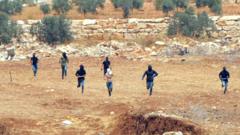**The recent signing of a peace deal between the Democratic Republic of Congo and Rwanda may mark a turning point in a long-standing conflict, raising hopes for a peaceful future in the region.**
**Historic Peace Accord Signed Between DR Congo and Rwanda in Washington**

**Historic Peace Accord Signed Between DR Congo and Rwanda in Washington**
**Groundbreaking agreement aims to cease decades-long conflict and opens new avenues for regional stability.**
In a significant diplomatic breakthrough, Rwanda and the Democratic Republic of Congo (DR Congo) have finalized a peace agreement in Washington, intended to bring an end to a prolonged conflict that has devastated both nations. The deal calls for the “disengagement, disarmament, and conditional integration” of armed groups perpetuating violence in eastern DR Congo, with the potential of enticing American investors to tap into the region's abundant mineral resources.
At the signing ceremony, flanked by senior U.S. officials including President Donald Trump, Congolese President Félix Tshisekedi heralded the treaty as a generational victory, promising to “close the chapter of violence and open one of hope and opportunity.” Trump echoed this sentiment, emphasizing that this treaty signals “a glorious triumph” for regional peace.
The accord follows a framework agreement established back in April, which set the groundwork for future negotiations. While expectations are high, the historical backdrop of previous failed peace deals in the region casts a shadow on the optimism surrounding this latest agreement. Congolese officials have described this moment as possibly the most consequential diplomatic success in over three decades.
Intense negotiations have been underway since tensions spiked earlier this year when the M23 rebel group escalated their territorial claims, culminating in the capture of strategic locations, including Goma, DR Congo's eastern capital. The humanitarian toll has been severe, with thousands killed and many more displaced.
To navigate this fraught landscape, Qatar played an intermediary role, urging both nations to come to the table. After pivotal meetings between Tshisekedi and Rwandan President Paul Kagame, a joint committee—backed by American support—was instituted to guide the peace process.
Despite the exciting prospects, significant challenges remain. Rwanda refutes allegations of backing M23 rebels, insisting that its military presence is purely defensive against groups like the FDLR, which is tied to the 1994 Rwandan genocide. Accusations of cross-border support from both sides continue to stoke tensions.
Details of the peace deal have emerged cautiously, with statement ambiguities regarding issues like the withdrawal of Rwandan troops—a critical sticking point in negotiations. As Rwandan foreign ministry expressed discontent over leaks from the deal discussions, clarifications are still anticipated regarding troop disengagement and the safety of internally displaced persons returning home.
There are also pressing questions about the future of the M23 and its commitments to disarmament, as well as prospects for humanitarian access to affected areas. The complexities surrounding this agreement reflect the delicate balance of interests and the need for sustained dialogue to achieve lasting peace.
For now, the world watches as both countries embark on what they hope is a path to resolution and stability in a region long plagued by conflict.


















